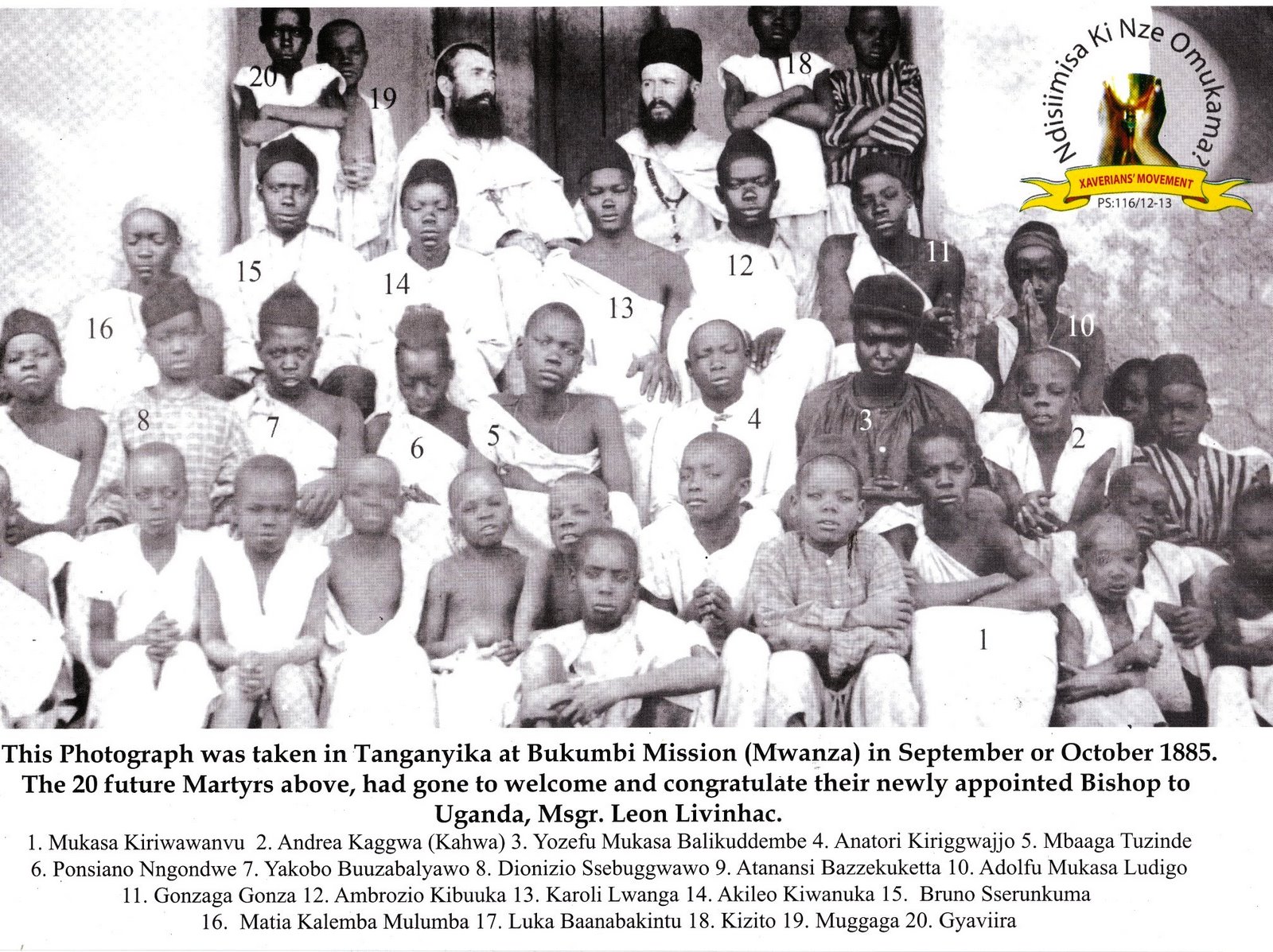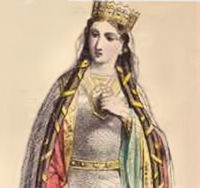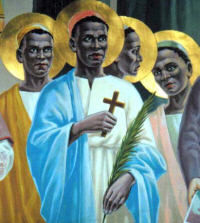Easter: June 3rd
Memorial of Sts. Charles Lwanga and Companions, Martyrs
Other Commemorations: St. Clotilde, Queen (RM)
» Enjoy our Liturgical Seasons series of e-books!
Today is the Memorial of St. Charles Lwanga and Companions (d. 1886), the companions numbering twenty-one other Ugandan martyrs. They are the first martyrs of Sub-Saharan Africa and true witnesses of the Christian faith. Charles Lwanga, a catechist and a young leader, was martyred in 1886 with a group of Catholic and Anglican royal pages, some of whom were not yet baptized. King Mwanga, who despised the Christian religion, gave orders that all the Christian pages in his service be laid upon a mat, bound, placed onto a pyre and burnt. This took place at Namugongo, just outside Kampala.
The Roman Martyrology commemorates St. Clotilde, queen (475-545). With her husband King Clovis (c. 466-511) she founded the Merovingian dynasty, which ruled the Franks for over 200 years. They were married in 492 or 493, and she converted him to Christianity in 496. When Clovis died, Clotilde retired to Tours. Her sons' quarrels caused her great sorrow. She died at the tomb of St. Martin of Tours and was buried in Sainte-Genevieve in Paris, a church that she and Clovis founded.
Continue praying the Pentecost Novena to the Holy Spirit.
Meditation for Tuesday of the Seventh Week of Easter:
Escort of the Glorious and Triumphant Christ
In making us God's children, baptism also makes us living members of the Mystical Body of which Christ is the head. St. Paul is so explicit about this! "Now you are the body of Christ, and members of member."
Now the members share in the glory of the head, and the joy of a person reacts upon all his body: this is why we share in all the treasures that Christ possesses: His joys, His glory, His beatitude become ours.
Christ Jesus takes our humanity up with Him to give it a place in His glory and beatitude. This is the great action of Jesus, the magnificent exploit of the Divine Giant: to reopen by His sufferings the gates of heaven to fallen humanity, and to transport it, in His train, into the splendours of heaven.
When Christ ascended into heaven, says St. Paul, a whole train of holy souls, a glorious conquest, entered therein with Him. But these souls of the just who escorted Jesus in His triumph are only the first-fruits of innumerable harvests. Unceasingly souls are ascending into heaven, until that day when the kingdom of Jesus shall have attained the measure of its fulness.
—Dom Columba Marmion, Christ in His Mysteries, p. 310
St. Charles Lwanga and Companions
Charles was one of twenty-two Ugandan martyrs who converted from paganism. He was baptized November 1885, a year before his death, and became a moral leader. He was the chief of the royal pages and was considered the strongest athlete of the court. He was also known as "the most handsome man of the Kingdom of the Uganda." He instructed his friends in the Catholic Faith and he personally baptized boy pages. He inspired and encouraged his companions to remain chaste and faithful. He protected his companions, ages 13-30, from the immoral acts and homosexual demands of the Babandan ruler, Mwanga.
 Mwanga was a superstitious pagan king who originally was tolerant of Catholicism. However, his chief assistant, Katikiro, slowly convinced him that Christians were a threat to his rule. The premise was if these Christians would not bow to him, nor make sacrifices to their pagan god, nor pillage, massacre, nor make war, what would happen if his whole kingdom converted to Catholicism?
Mwanga was a superstitious pagan king who originally was tolerant of Catholicism. However, his chief assistant, Katikiro, slowly convinced him that Christians were a threat to his rule. The premise was if these Christians would not bow to him, nor make sacrifices to their pagan god, nor pillage, massacre, nor make war, what would happen if his whole kingdom converted to Catholicism?
When Charles was sentenced to death, he seemed very peaceful, one might even say, cheerful. He was to be executed by being burned to death. While the pyre was being prepared, he asked to be untied so that he could arrange the sticks. He then lay down upon them. When the executioner said that Charles would be burned slowly to death, Charles replied by saying that he was very glad to be dying for the True Faith. He made no cry of pain but just twisted and moaned, "Katonda! (O my God!)." He was burned to death by Mwanga's order on June 3, 1886. Pope Paul VI canonized Charles Lwanga and his companions on June 22,1964. We celebrate his memorial on June 3rd on the Roman Calendar. Charles is the Patron of the African Youth of Catholic Action.
— www.Savior.org
This photograph was taken a year before their martyrdom. St. Charles is number 13. (For the full size image right click "view image" on the photo below; image from Ite Ad Joseph.)

Patronage: African Catholic Youth Action; Catholic youth; converts; torture victims; Courage Apostolate
Highlights and Things to Do:
- Learn more about Uganda, Kenya and Nigeria. See what the Catholic Relief Services are doing and how you might help. Visit the Missionary Childhood Association to find out more about mission work in Africa and to find activities and prayer services.
- These Christian martyrs refused to give in to the homosexual demands of the king. They are saints who respected their bodies and loved the commandments of God. Pray today to be strong in times of temptations against purity. Read the Congregation for the Doctrine of the Faith's document, Pastoral Care of Homosexual Persons.
- Read more about St. Charles and his companions:
- Uganda Martyrs Shrine
- See Catholic Cuisine for some food ideas for this feast.
St. Clotilde
 St. Clotilde was Queen of the Franks, born in Lyons France, probably around the year 470. In 492 or 493, she married Clovis, king of the Franks, converting him to Christianity on Christmas Day. When Clovis died in 511, Clotilde had to deal with feuds and murders conducted by her sons: Clodomir, king of Orleans; Childebert I, king of Paris; and Clotaire, king of Soissons and the Franks. When Clotaire killed two of his nephews, who were the brothers of St. Clodoald (Cloud), Clotilde left Paris and resided thereafter in Tours.
St. Clotilde was Queen of the Franks, born in Lyons France, probably around the year 470. In 492 or 493, she married Clovis, king of the Franks, converting him to Christianity on Christmas Day. When Clovis died in 511, Clotilde had to deal with feuds and murders conducted by her sons: Clodomir, king of Orleans; Childebert I, king of Paris; and Clotaire, king of Soissons and the Franks. When Clotaire killed two of his nephews, who were the brothers of St. Clodoald (Cloud), Clotilde left Paris and resided thereafter in Tours.
—Excerpted from Our Sunday Visitor's Encyclopedia of Saints by Matthew Bunson, Margaret Bunson, Stephen Bunson
Highlights and Things to Do:
- Read this longer biography of St. Clotilde by Fr. Butler.
- Read more about St. Clotilde:






